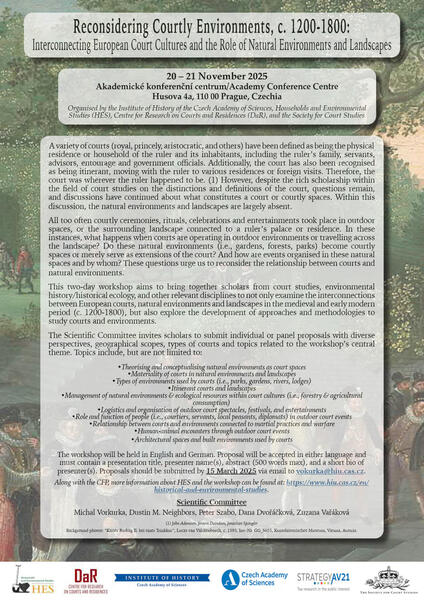Reconsidering Courtly Environments, c. 1200–1800: Interconnecting Court Cultures and the Role of Natural Environments and Landscapes
 20. 11. 2025 – 21. 11. 2025
20. 11. 2025 – 21. 11. 2025
 Academy Conference Centre, Husova 4a, 110 00 Prague
Academy Conference Centre, Husova 4a, 110 00 Prague 
The international conference Reconsidering Courtly Environments, c. 1200–1800: Interconnecting Court Cultures and the Role of Natural Environments and Landscapes, organised by the Institute of History of the Czech Academy of Sciences, Households and Environmental Studies (HES), Centre for Research on Courts and Residences (DaR), and the Society for Court Studies, will take place on 20 and 21 November 2025 at the Academy Conference Centre (Husova 4a, 110 00 Prague).
A variety of courts (royal, princely, aristocratic, and others) have been defined as being the physical residence or household of the ruler and its inhabitants, including the ruler’s family, servants, advisors, entourage and government officials. Additionally, the court has also been recognised as being itinerant, moving with the ruler to various residences or foreign visits. Therefore, the court was wherever the ruler happened to be. (1) However, despite the rich scholarship within the field of court studies on the distinctions and definitions of the court, questions remain, and discussions have continued about what constitutes a court or courtly spaces. Within this discussion, the natural environments and landscapes are largely absent.
All too often courtly ceremonies, rituals, celebrations and entertainments took place in outdoor spaces, or the surrounding landscape connected to a ruler’s palace or residence. In these instances, what happens when courts are operating in outdoor environments or travelling across the landscape? Do these natural environments (i.e., gardens, forests, parks) become courtly spaces or merely serve as extensions of the court? And how are events organised in these natural spaces and by whom? These questions urge us to reconsider the relationship between courts and natural environments.
This two-day workshop aims to bring together scholars from court studies, environmental history/historical ecology, and other relevant disciplines to not only examine the interconnections between European courts, natural environments and landscapes in the medieval and early modern period (c. 1200-1800), but also explore the development of approaches and methodologies to study courts and environments.
The Scientific Committee invites scholars to submit individual or panel proposals with diverse perspectives, geographical scopes, types of courts and topics related to the workshop’s central theme. Topics include, but are not limited to:
- Theorising and conceptualising natural environments as court spaces
- Materiality of courts in natural environments and landscapes
- Types of environments used by courts (i.e., parks, gardens, rivers, lodges)
- Itinerant courts and landscapes
- Management of natural environments & ecological resources within court cultures (i.e., forestry & agricultural consumption)
- Logistics and organisation of outdoor court spectacles, festivals, and entertainments
- Role and function of people (i.e., courtiers, servants, local peasants, diplomats) in outdoor court events
- Relationship between courts and environments connected to martial practices and warfare
- Human-animal encounters through outdoor court events
- Architectural spaces and built environments used by courts
The workshop will be held in English and German. Proposal will be accepted in either language and must contain a presentation title, presenter name(s), abstract (500 words max), and a short bio of presenter(s). Proposals should be submitted by 15 March 2025 via email to vokurka@hiu.cas.cz.
 20. 11. 2025 – 21. 11. 2025
20. 11. 2025 – 21. 11. 2025
 Academy Conference Centre, Husova 4a, 110 00 Prague
Academy Conference Centre, Husova 4a, 110 00 Prague 

